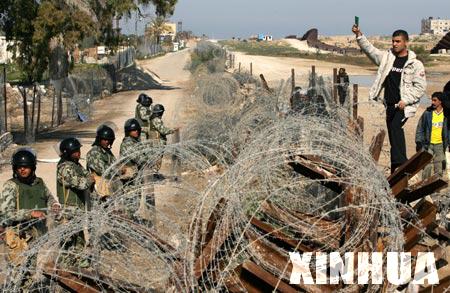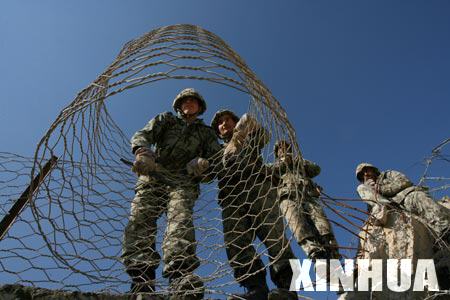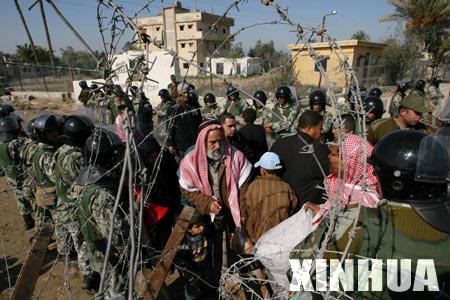A Palestinian shows his ID to Egyptian soldiers guarding on the Egyptian side of the Rafah border crossing along the Egypt-Gaza border, February 3, 2008. Egyptian troops started closing the last breach in the Rafah border on Sunday, only allowing Palestinians and Egyptians to cross the border to return to their homes on the other side but preventing any new cross-border movement. (Xinhua Photo)
Egypt closed the last breach of the border fence along the Egyptian-Gaza border on Sunday morning amid efforts exerted to mediate among parties concerned on the administration of Rafah crossing.
About 300 Egyptian military troops were deployed near Rafah crossing along the Egyptian border with Gaza to stop the flow of Palestinians into the Egyptian side, a security source told Xinhua on condition of anonymity.
Egyptian forces, with barbed wire and metal barricades, resealed the only remaining gap on the Egyptian side of the border fence, which was blew up by Palestinian militants on January 23 to allow tens of thousands of Palestinians in Gaza to cross into Egypt in the past 11 days.
The Palestinian Islamic Resistance Movement (Hamas), who controls the Gaza Strip, has promised to help seal the border in coordination with Egypt.
Meanwhile, according to report of the pan-Arab television al-Jazeera, hundreds of Palestinians still gathered at the Gazan side of Rafah border crossing.
Egyptian troops close the last breach in the Rafah border between Egypt and the Gaza Strip, February 3, 2008. (Xinhua Photo)
Egyptian presidential spokesman Suleiman Awad vowed on Sunday that his country would never allow the incident of Rafah crossing to happen again.
In sympathy with the humanitarian suffering of Palestinians in Gaza, Egypt chose to allow the massive flow of Gazans into the country in the past 11 days, Awad was quoted by the official MENA news agency as saying.
But Egypt "will not abandon its right, duty and responsibility to ensure such an incident is never repeated," Awad said.
Some Palestinians pass Egyptian soldiers at the Rafah border between Egypt and the Gaza Strip, February 3, 2008. (Xinhua Photo)
On January 23, Hamas militants blew up the border wall separating Gaza and Egypt, allowing the Palestinians living in the poor isolated Gaza enclave to cross into Egypt to purchase daily needs.
The developments at Rafah prompted Egypt to invite Hamas and Palestinian President Mahmoud Abbas in the past few days for separate talks in Cairo to discuss the operation of the crossing, Gaza's only gateway to the outside world bypassing Israel.
Abbas and a Hamas delegation arrived in Cairo on Wednesday and held talks with Egyptian officials on reopening Rafah crossing which has been closed since last June when Hamas took over the Gaza Strip by force.
Abbas, like Egypt, wants the crossing to rework based on a US-brokered 2005 deal which stipulates the presence of European Union(EU) monitors as a third party on the passage but rules out any Hamas involvement in the management of the crossing.
The EU monitors left the crossing last June when Hamas seized control of Gaza after routing security forces loyal to Abbas.
EU foreign policy chief Javier Solana, who arrived in Cairo Saturday on a two-day visit to Egypt, said Sunday the European body is prepared to resume its role in monitoring Rafah crossing under the 2005 agreement.
"We are ready to resume work in Rafah crossing in case an agreement was reached," said Solana following talks with Arab League (AL) Secretary General Amr Moussa, adding the EU is seeking to cooperate with parties concerned to work out an agreement on the subject.
Noting he held important and beneficial talks with Egyptian and AL officials, including Egyptian President Hosni Mubarak, Solana said he will return to the region to follow up the development within the coming weeks.
But the separate talks between Egypt, the Palestinian National Authority and Hamas in the past days had made no breakthrough on the issue of Rafah crossing management.
Mahmoud Zahar, who heads the Hamas delegation, said Wednesday Hamas demands a key role on running Rafah crossing if talks succeeded to reopen the passage.
On Saturday, a Hamas negotiator said the group accepts the return of EU monitors to Rafah border crossing if they reside in Gaza or Egypt, but not in Israel.
After three days of separate talks in Cairo, Hamas told Egypt that it has reservations on the 2005 international agreement, said the movement negotiator Mohammed Nasser.
(Xinhua News Agency February 4, 2008)




